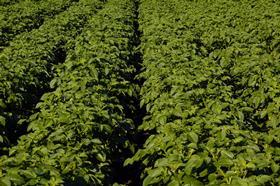
The door has been opened for UK seed potato producers to export to Kenya after three British varieties were recommended for release in the country.
The announcement follows trials involving AHDB, James Hutton Ltd, SASA and Seeds2B Africa (part of the Syngenta Foundation).
Ten potato varieties were tested at three separate farms over two seasons with free variety Cara, and two James Hutton Ltd varieties, Gemson and Lady Balfour, making the grade.
Already about two to three million tonnes of potatoes are grown annually in Kenya, making it the country’s most important food crop after maize, however most farmers use home-saved seed and achieve yields as low as 10t per hectare.
In the trials Cara yielded very strongly in both seasons, with a combined average yield of 52t/ha. However, the top performer in terms of yield was Lady Balfour at 56t/ha, while Gemson achieved 42t/ha on average.
Rob Burns, head of crop market trade development at AHDB, said: “This is great news for GB seed producers and our next steps now will be to support them to create links in Kenya so that they can take advantage of this opportunity.
“Kenya has a burgeoning middle class; and as well as table varieties there is a growing need for processing potato seed to supply the growing market for premium potato-based products such as crisps and chips.”
Jonathan Snape, head of James Hutton Ltd, added: “We are delighted that two of the varieties we bred for Greenvale AP and Grampian Growers have performed so well in these trials and we will be engaging with representatives of the Kenyan potato industry in order to open up this potentially important new export market.
“We are grateful for the support of the Scottish Society of Crop Research who facilitated getting high quality Scottish seed out to Kenya for the trials.”
As Kenya is keen to approve more processing varieties the team are considering resubmitting another variety called Hermes for a third season.
Export liaison for SASA Jackie Gibson explained: “The three varieties recommended for release so far have only been approved as table varieties.
“While processing variety Hermes performed very well in both seasons its average yield of 41t/ha was very slightly too low to be recommended for release.
“However with processing varieties they are looking for at least 21 per cent dry matter content. As Hermes has a recorded dry matter of 23 per cent we believe that with a third season of trials and additional testing it can achieve recommendation as a processing variety.”



